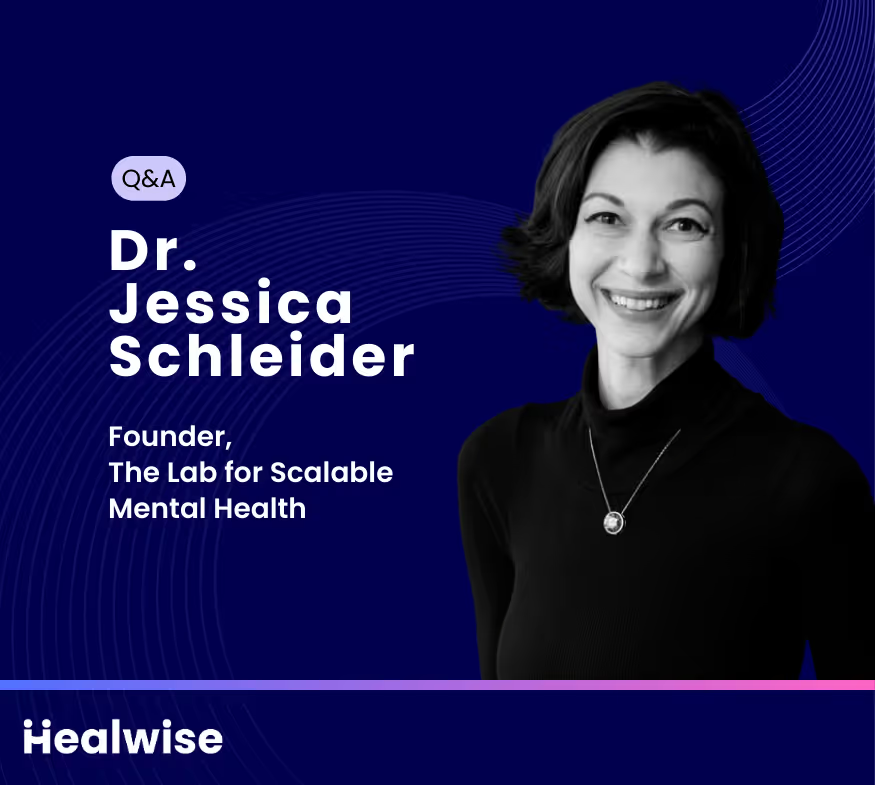
For many people seeking mental health support, the hardest part isn’t asking for help—it’s figuring out where to start.
Despite decades of research and growing public awareness, the majority of people in the U.S. who need mental healthcare still never access it. That gap isn’t due to lack of need or lack of effort. It’s a reflection of a system that’s confusing, inaccessible, and often out of reach.
Dr. Jessica Schleider, a clinical psychologist, researcher, and founder of the Lab for Scalable Mental Health at Northwestern University Feinberg School of Medicine, has spent her career trying to close that gap. From digital tools to single-session interventions, Schleider’s work focuses on realistic, research-backed solutions that meet people where they are—especially those left behind by traditional models of care.
We spoke with Dr. Schleider about her work, the deeper flaws in how care is delivered, and why it’s time to reimagine engagement in mental health. Here are a few of the biggest takeaways from our conversation.
One of the most striking realities Dr. Schleider highlighted is just how many people never make it into care at all.
“Eighty percent of youth and 50% of adults who need mental healthcare never access anything at all,” she said. “And among those who do, only a small sliver are going to access evidence-based services that we’ve been studying for decades.”
Cost is just one piece of the problem. Dr. Schleider pointed to a system that’s hard to navigate even for experts. “Even when I, as someone with a Ph.D. in clinical psychology, try to navigate the treatment system for friends and family members, it’s virtually impossible,” she said. “And you shouldn’t need a Ph.D. to have a fighting chance at finding a service provider who meets what you’re looking for.”
That disconnect between how care is delivered and how people actually engage with it has shaped much of Dr. Schleider’s work. She’s become a leading advocate for single-session interventions—research-backed tools designed to offer meaningful support without requiring long-term commitment.
These tools don’t assume that people will come back for a second session. Instead, they’re built to deliver impact in a single encounter, because for many, that’s all they’ll realistically get.
“We’re not trying to fight the realities of healthcare access patterns,” she explained. “We’re trying to work within them and around them to make sure that people can still get something that’s helpful.”
In the world of digital mental health, this perspective is something of a paradigm shift. While many in the field focus on building tools that keep users engaged for as long as possible, Dr. Schleider sees that as a flawed goal.
“A lot of folks focus on the so-called engagement problem—how do we keep people coming back to a mental health app over and over again,” she said. “Despite the fact that one, that doesn’t happen. And two, it’s kind of counter to the idea that people can get better.”
Instead, her lab focuses on offering flexible, self-guided tools that meet people where they are and respect their time and capacity.
“Each encounter is a standalone opportunity for change,” she said. “It takes the pressure off people to feel like they need to keep coming back… and removes the risk of making people feel like they’re failing because they didn’t do the treatment ‘correctly.’”
Dr.Schleider’s work is a reminder that fixing mental healthcare doesn’t just mean creating more of the same. It means building smarter systems that reflect the lives, needs, and constraints of real people—and acknowledging that access isn’t a given. It’s a barrier that must be actively dismantled.
Mental health’s biggest challenges won’t be solved in silos. Learn more about Healwise and how we operate the intersection of mental health and technology.